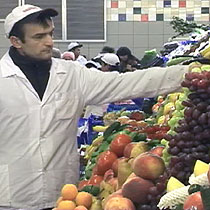2007年VOA标准英语-Russia Bans Foreigners From Working at Markets
时间:2019-01-12 作者:英语课 分类:2007年VOA标准英语(四月)
By Anya Ardayeva
Moscow
23 April 2007
A new law in Russia bans foreigners from working as clerks in retail 1 stores and markets. Foreigners are able to work as loaders, cleaners, wholesalers or managers, but they are not allowed to sell directly to the public. Russian officials say the new legislation is aimed at combating a shadow economy, but human rights and migrant groups say the new law is unfair and unworkable. Anya Ardayeva reports from Moscow.

Russian immigration, fruit stand
Millions of migrant workers in Russia now find themselves out of a job.
For the past ten years, Khalimjon Akhmadaliyev, from Tajikistan, has worked 12 hours a day selling vegetables at various Moscow markets.
"It's unfair because so many people worked so hard to come here and earn bread to feed their families and their children,” he says. “My children study here, I need to bring them up. I don't know what to do next. I guess I will have to pull my kids out of school and return home."
In January, Russia passed a new law banning foreigners from selling alcohol and medicine throughout the country. It also, as of April 1st, banned foreigners from selling at markets. The ban followed a number of troubling incidents – the largest, a riot in the northern Russian town of Kondopoga. Two local men died in a fight with ethnic 2 Chechens.
Now, human rights activists 3 say the bill might create more racial tension in Russia. For months, anti-racism campaigners have warned of growing racist 4 sentiment in the country, especially after thousands of people in Moscow and other Russian cities last November participated in a so-called "Russian March," organized by the ultra-nationalist "Movement Against Illegal Immigration"

Nikita Mkrtchyan
Nikita Mkrtchyan is the chief expert for immigration analysis at Moscow's Economic Forecast Institute. He says that by imposing 5 the new law, government is simply trying to boost ratings in an election year.
"This law has been passed because of some ideas that have something to do with pre-election period, to show that the power is meeting the demands of the people,” he says. “If the people do not like seeing foreign people at markets, if they don't want to see foreign faces at the markets, then the power does everything it can to get rid of those people."
Mkrtchyan also says this policy can have damaging consequences for the country's economy. While there are a million legal migrants working in Russia, Russian media reports suggest that the number of illegals is estimated at up to 12 million. Many come from much poorer countries, and often take jobs that Russian nationals do not want.
"Due to our economic growth, we will soon face a lack of labor 6 resources everywhere. Of course we can't solve this without immigrants," says Mkrtchyan.
In October, Russian President Vladimir Putin said that the markets were often run by criminals with "ethnic flavor." He called on the government to take measures to "protect Russian producers and the local population."
Mktrchyan also is concerned that the new ban will boost corruption 8 among bureaucrats 9 and police as desperate foreigners offer bribes 10 to dodge 11 the new rules. Corruption is already rampant 12 in Russia. Last year, the anti-corruption organization Transparency International ranked Russia as one of the most corrupt 7 countries in the world.
- In this shop they retail tobacco and sweets.这家铺子零售香烟和糖果。
- These shoes retail at 10 yuan a pair.这些鞋子零卖10元一双。
- This music would sound more ethnic if you played it in steel drums.如果你用钢鼓演奏,这首乐曲将更具民族特色。
- The plan is likely only to aggravate ethnic frictions.这一方案很有可能只会加剧种族冲突。
- His research work was attacked by animal rights activists . 他的研究受到了动物权益维护者的抨击。
- Party activists with lower middle class pedigrees are numerous. 党的激进分子中有很多出身于中产阶级下层。 来自《简明英汉词典》
- a series of racist attacks 一连串的种族袭击行为
- His speech presented racist ideas under the guise of nationalism. 他的讲话以民族主义为幌子宣扬种族主义思想。
- The fortress is an imposing building.这座城堡是一座宏伟的建筑。
- He has lost his imposing appearance.他已失去堂堂仪表。
- We are never late in satisfying him for his labor.我们从不延误付给他劳动报酬。
- He was completely spent after two weeks of hard labor.艰苦劳动两周后,他已经疲惫不堪了。
- The newspaper alleged the mayor's corrupt practices.那家报纸断言市长有舞弊行为。
- This judge is corrupt.这个法官贪污。
- The people asked the government to hit out against corruption and theft.人民要求政府严惩贪污盗窃。
- The old man reviled against corruption.那老人痛斥了贪污舞弊。
- That is the fate of the bureaucrats, not the inspiration of statesmen. 那是官僚主义者的命运,而不是政治家的灵感。 来自辞典例句
- Big business and dozens of anonymous bureaucrats have as much power as Japan's top elected leaders. 大企业和许多不知名的官僚同日本选举出来的最高层领导者们的权力一样大。 来自辞典例句
- It was alleged that he had taken bribes while in office. 他被指称在任时收受贿赂。
- corrupt officials accepting bribes 接受贿赂的贪官污吏
- A dodge behind a tree kept her from being run over.她向树后一闪,才没被车从身上辗过。
- The dodge was coopered by the police.诡计被警察粉碎了。